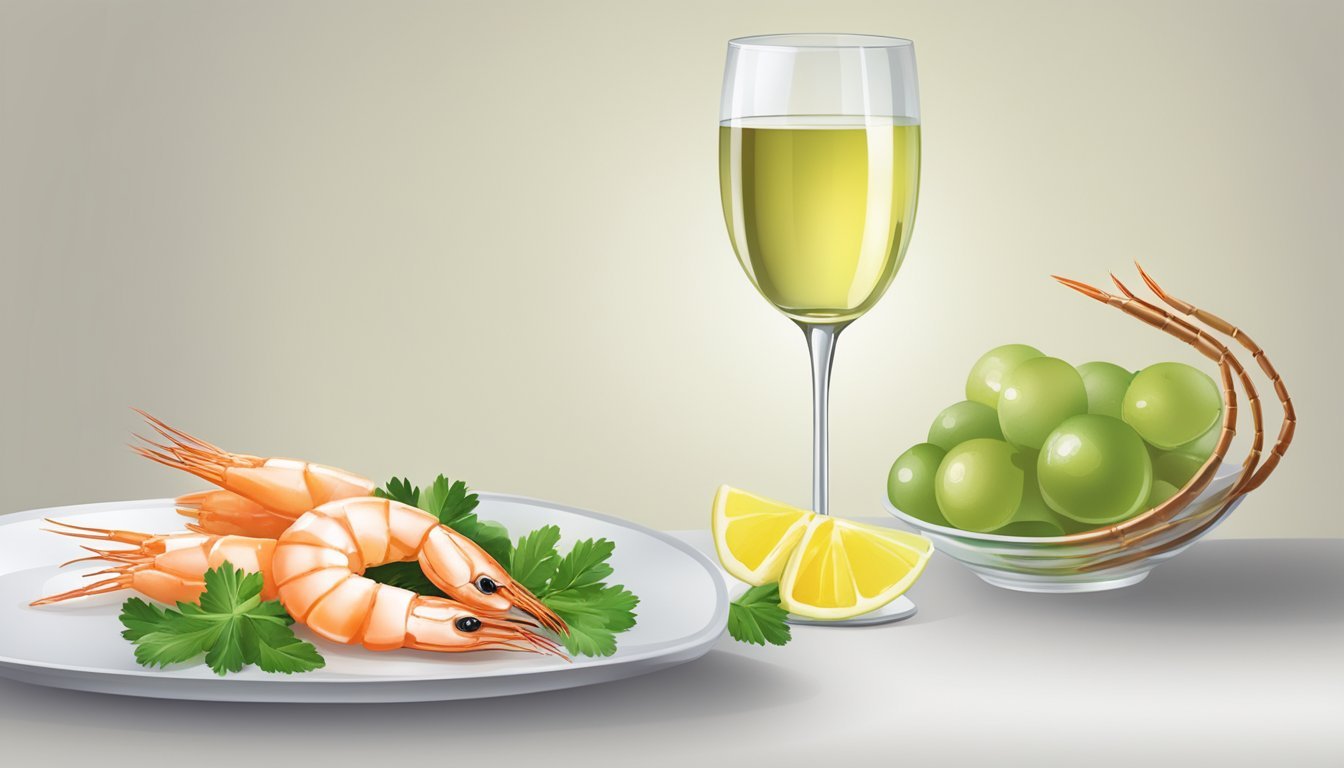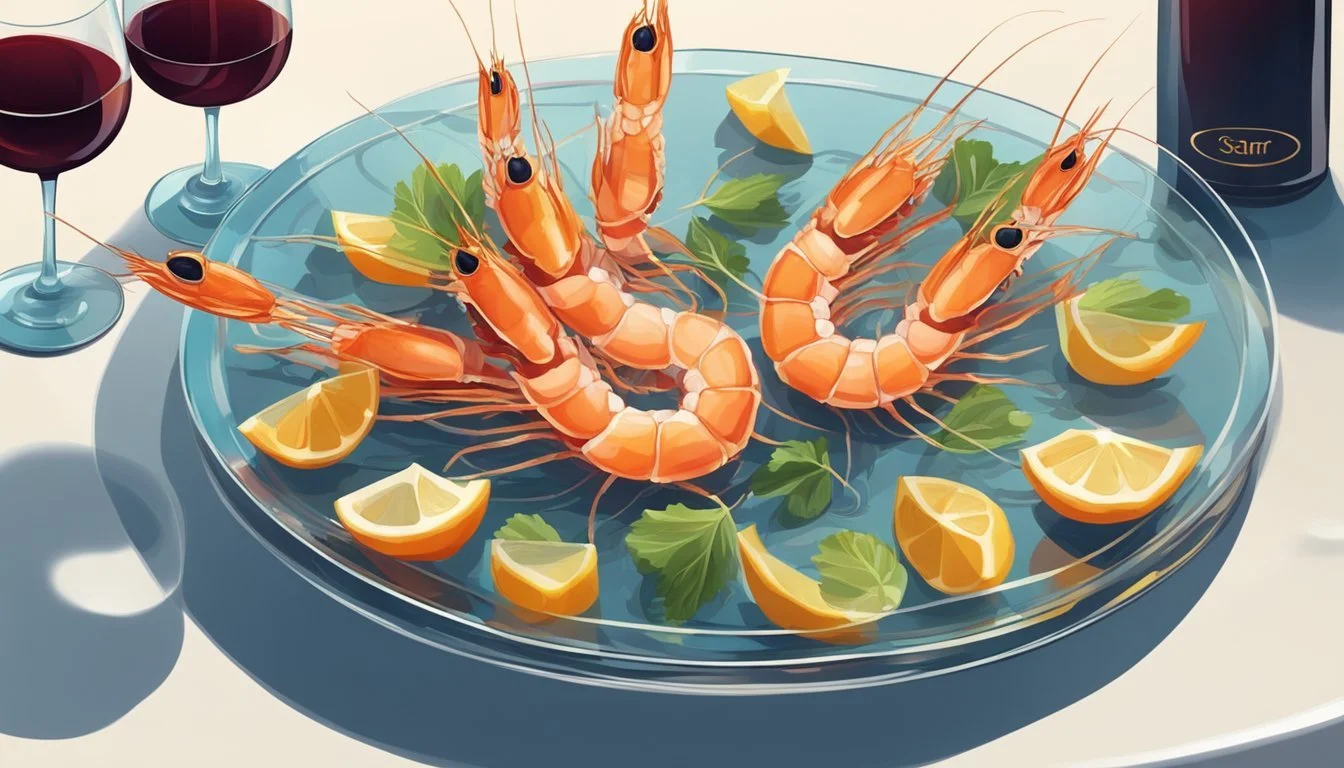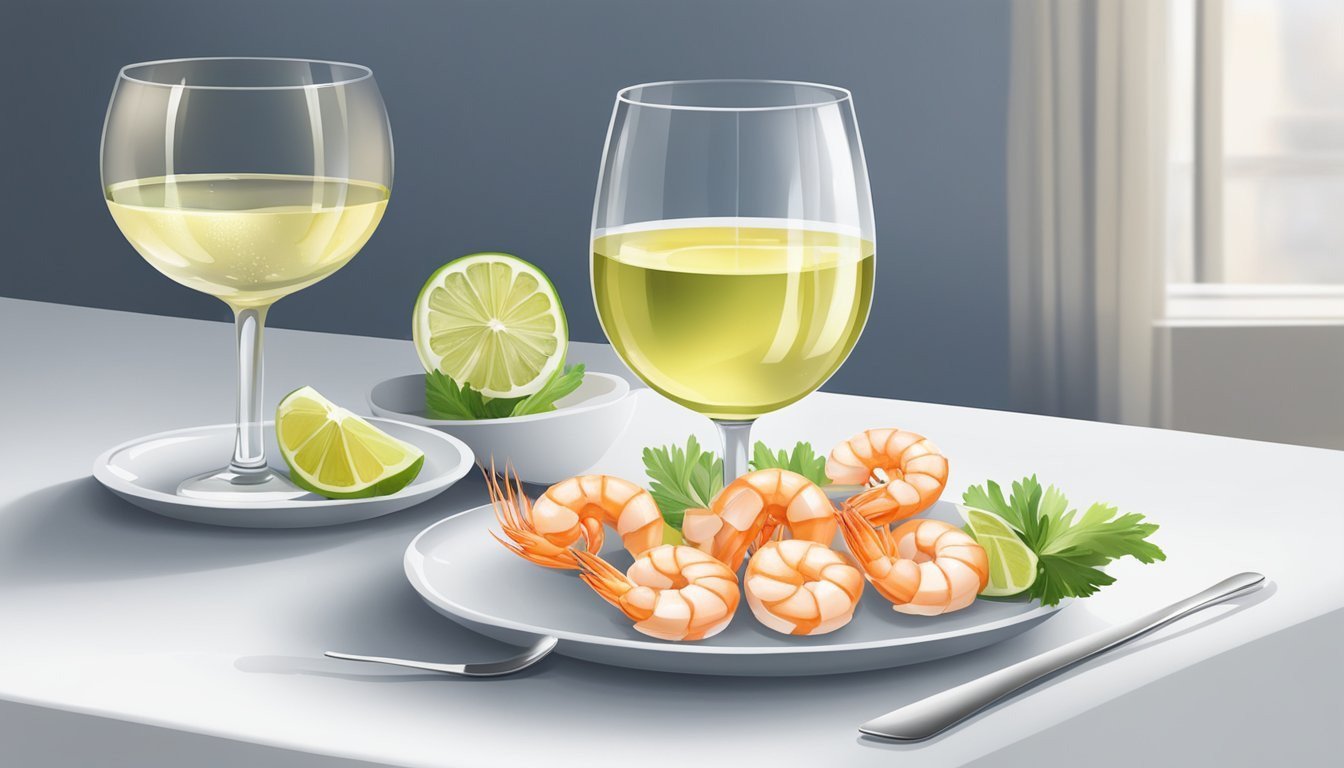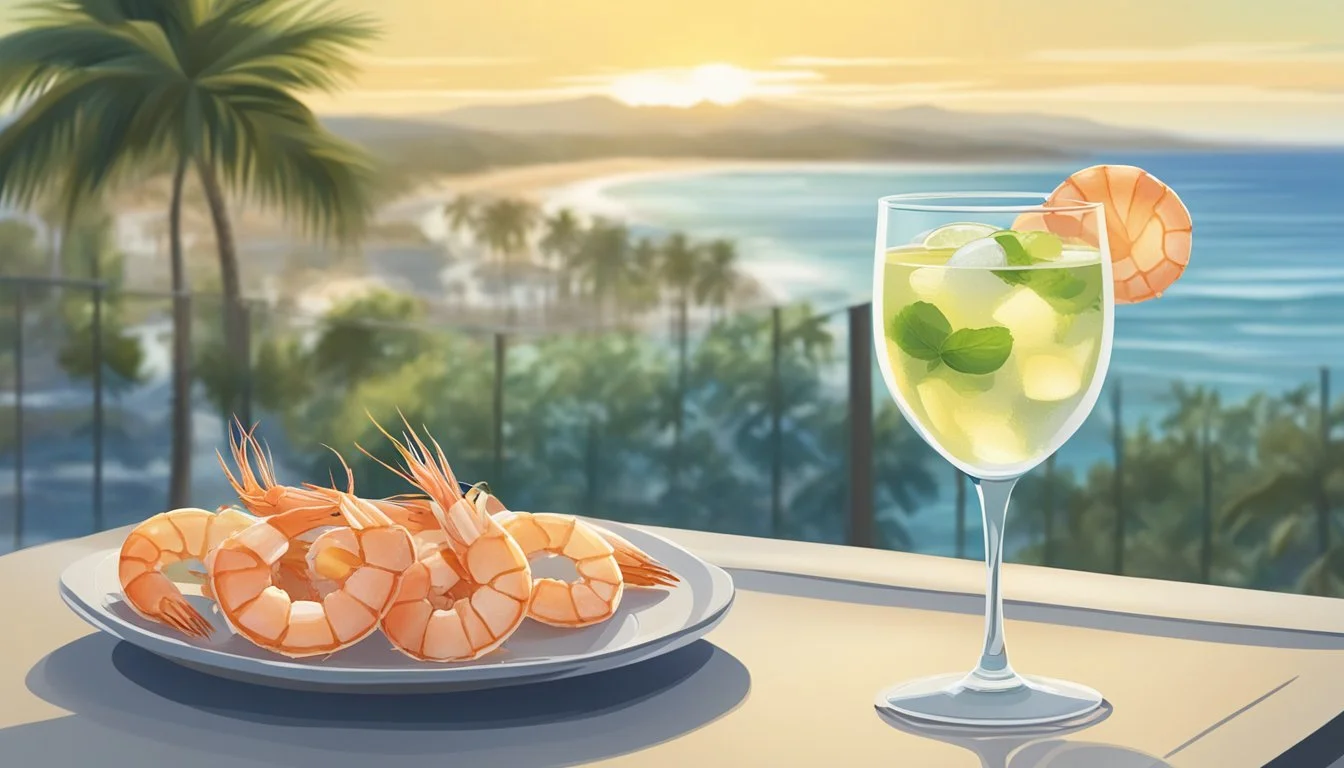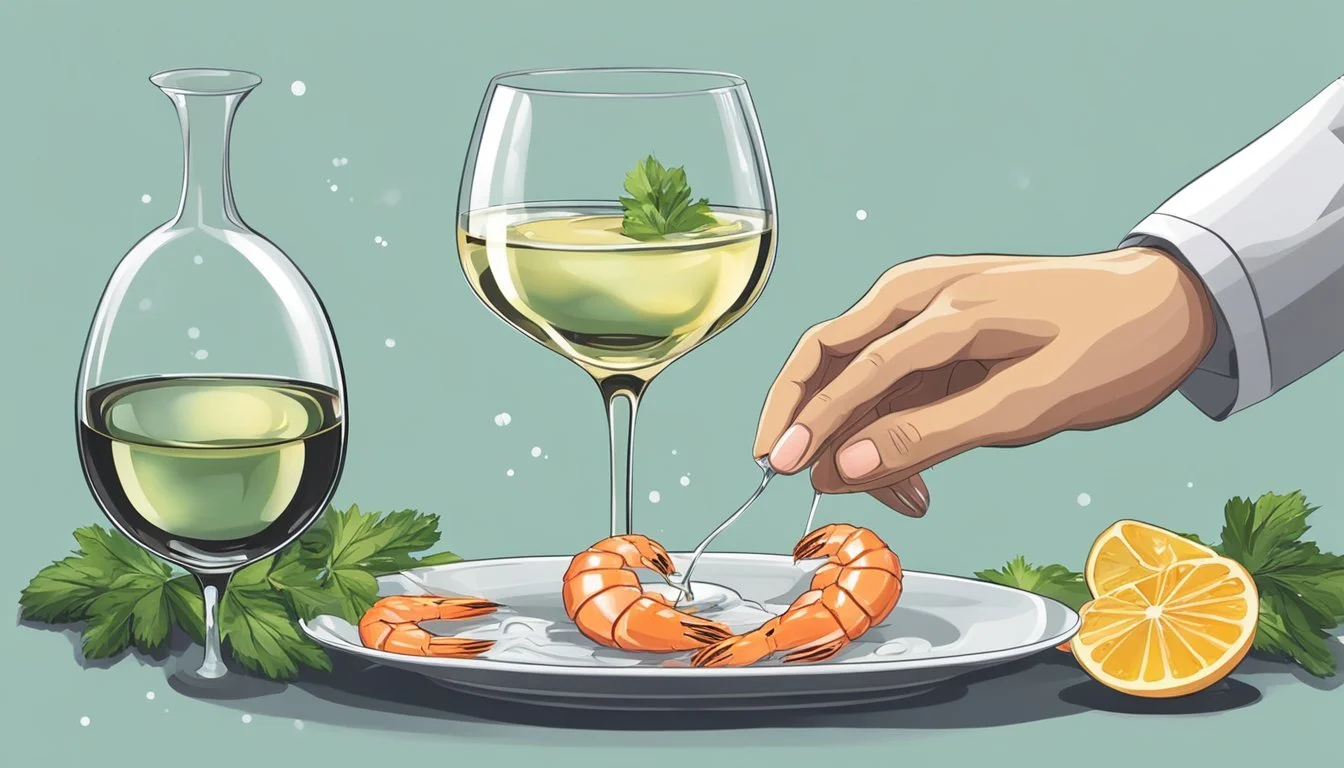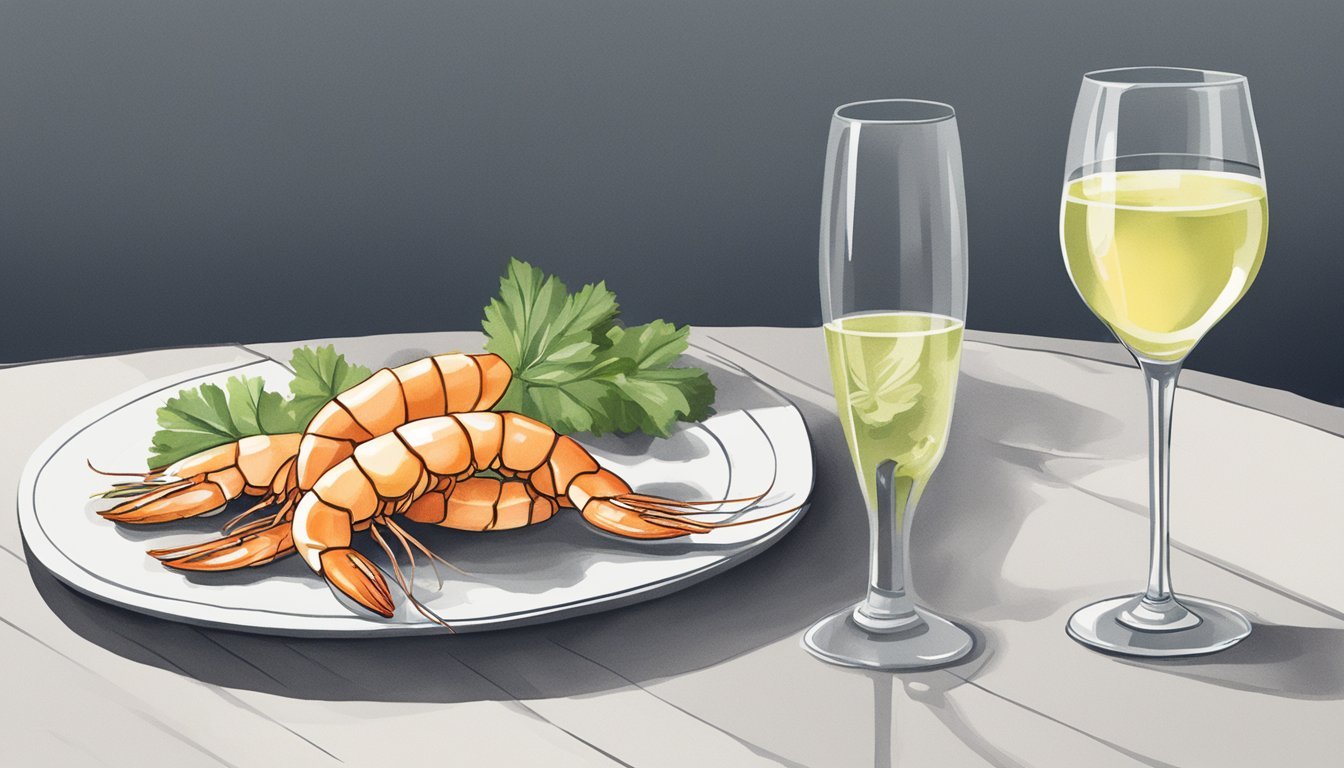What Wine Goes Well with Shrimp Cocktail?
Pairing Seafood and Vino Perfectly
Selecting the right wine to complement a dish can elevate the dining experience by enhancing the flavors of both the food and the wine. Shrimp (What wine goes well with shrimp?) cocktail, a popular appetizer featuring cooked and chilled shrimp served with a tangy cocktail sauce, presents a unique pairing challenge. The ideal wine pairing should balance the shrimp's delicate sweetness and the sauce's spicy and robust flavors.
White wines are traditionally favored for seafood (What wine goes well with seafood?) due to their bright acidity and clean profiles, which resonate well with the lightness of shrimp. Crisp white wines such as Muscadet, Riesling, and Sauvignon Blanc are particularly adept at complementing shrimp cocktail. These wines offer a refreshing counterpoint to both the meatiness of the shrimp and the zesty kick of the cocktail sauce.
When choosing a wine pair for shrimp cocktail, selecting a variety with enough acidity to cut through the sauce's sharpness is essential. Wines that bring their own subtle fruit notes or a slight minerality can act as a palate cleanser, refreshing the taste buds between bites. For those who enjoy a touch of effervescence, a dry Prosecco with light floral notes can also serve as a delightful accompaniment to this classic appetizer.
Essentials of Wine Pairing
Selecting the right wine to complement a shrimp cocktail involves more than just picking a bottle off the shelf; it requires an understanding of taste profiles, the role of acidity, and the balance between sweetness and salinity in both the wine and the dish.
Understanding Taste Profiles
One must consider how the flavors of the shrimp cocktail will interact with the chosen wine. Shrimp cocktail often has a salty taste with a spicy kick from the cocktail sauce. The ideal wine should offer a counterbalance to these flavors rather than overpower them. Wines that exhibit fruit-forward and slight sweetness can enhance the taste of the shrimp.
The Role of Acidity in Wine Pairings
Acidity in wine can be a pivotal factor when paired with food. A wine with higher acidity tends to pair well with dishes like shrimp cocktail because it cuts through the dish's saltiness and complements the slight sweetness of the shrimp. For example, a glass of Muscadet or an off-dry Riesling brings out the inherent flavors of the seafood without overwhelming the palate.
Balancing Sweetness and Salinity
The interplay between sweetness in wine and the salinity of a shrimp cocktail is delicate. A touch of sweetness in a wine helps to mitigate the heat from the horseradish in the cocktail sauce. In this context, a slight sweetness refers to residual sugar in the wine which, when paired correctly, supports the spicy aspect of the dish. Off-dry wines, meaning those with a modest amount of residual sugar, tend to offer this balance and can be especially harmonious with the taste profile of a shrimp cocktail.
Best Wine Varieties for Shrimp Cocktail
Selecting the right wine to complement shrimp cocktail hinges on balance and harmony. The wine should have the acidity to cut through the rich cocktail sauce, while also possessing enough subtlety not to overpower the delicate flavor of the shrimp.
White Wines
Muscadet: This is a dry white wine with crisp acidity, a perfect match for shrimp cocktail's succulence.
Sauvignon Blanc: Known for its zesty lime, green apple, and mineral notes, Sauvignon Blanc offers a refreshing contrast to the spiciness of the cocktail sauce.
Dry Riesling: With just the right amount of fruitiness and a hint of mineral undertones, a dry Riesling complements shrimp without overwhelming it.
Albariño: This Spanish white wine, with its aromas of peaches and floral notes, pairs beautifully with the seafood's natural sweetness.
Chenin Blanc: It brings a balance of acidity and fruity flavors that can highlight the best in a shrimp cocktail.
Pinot Grigio: With its light body and citrus notes, Pinot Grigio offers a clean palate cleanse with each bite of shrimp.
Sparkling Wines
Prosecco: Its light and fruity profile with a touch of sweetness tempers the spiciness of the shrimp cocktail sauce.
Champagne: A classic choice that brings both elegance and sharp acidity to the table, making it a sophisticated companion for shrimp cocktail.
Rosé Wines
Provencal Rosé: A light and crisp rosé with notes of berries that can cool the palate after a bite of spicy cocktail sauce.
Sparkling Rosé: The effervescence and subtle sweetness of a sparkling rosé can complement the texture and flavors of shrimp cocktail.
Special Mention: Red Wines
Pinot Noir: A light-bodied red wine like Pinot Noir, with its low tannins and fruity notes, can occasionally pair well with grilled shrimp.
Grenache: Another red wine option, Grenache offers juicy red fruit flavors that can match the charred, smoky taste of grilled shrimp, if included in the cocktail.
Choosing the right wine for a shrimp cocktail can elevate the dining experience. The listed wine varieties offer diverse flavor profiles that can enhance the taste and enjoyment of this classic appetizer.
Nuances of Shrimp Flavor
Shrimp's delicate and slightly sweet taste profiles can transform depending on the dish and accompanying seasonings. Discerning the flavor complexities is crucial for choosing the ideal wine to enhance the dining experience.
Classic Shrimp Dishes
Shrimp as a culinary ingredient demonstrates remarkable versatility across various dishes. Shrimp scampi, a beloved Italian-American classic, features the crustacean sautéed in a rich sauce of garlic, butter, and lemon. On the other hand, shrimp gumbo epitomizes the soul of Cajun and Creole cuisine with its hearty and spiced flavor. Within the spectrum of shrimp dishes, barbecue shrimp brings a smokey and often spicy twist, while shrimp salad opts for a fresher and more herbaceous character.
Common Shrimp Dishes and Their Flavor Profiles:
Shrimp Scampi: Garlic, butter, lemon.
Shrimp Gumbo: Rich, spicy, with Cajun seasoning.
Barbecue Shrimp: Smokey, often spice-rubbed.
Shrimp Salad: Fresh, herb-infused.
Spices and Seasoning Influences
The application of spices and herbs plays a pivotal role in defining the final flavor of a shrimp dish. Influences can range from bold Cajun spices, which imbue dishes with heat and complexity, to refined herb combinations like dill or parsley in shrimp salad, imparting a fresh subtlety. Cocktail sauce, often served with chilled shrimp, typically combines the sharp tang of horseradish and the acidity of lemon juice, requiring consideration when selecting a wine pairing.
Key Components in Shrimp Dish Seasoning:
Cajun Seasoning: Paprika, cayenne, garlic powder.
Herbs: Dill, parsley, chives.
Cocktail Sauce: Horseradish, lemon juice, ketchup.
By acknowledging the flavor nuances brought forth by these various preparations and seasonings, one can better assess the suitability of a wine to complement the shrimp's taste profile.
Advanced Food and Wine Interaction
When pairing wine with shrimp cocktail, one must consider the balance between flavors and how they interact on a sophisticated level. It's essential to take into account aspects such as flavor intensity, tannins, and the sweet, briny nature of the shrimp.
Contrasting Flavors
Saltiness and Sweetness: Shrimp cocktail often contains a slight salty-briny taste, which is beautifully offset by a touch of sweetness in a wine. Choosing a wine with a hint of residual sugar can enhance the overall experience.
Examples: An off-dry Riesling or a Prosecco can provide a delightful contrast to the shrimp's saltiness.
Heat and Alcohol: The spice component, typically from horseradish or cocktail sauce, can clash with high alcohol wines. It's recommended to opt for wines with lower alcohol to avoid intensifying the heat.
Examples: Lower alcohol options such as Muscadet or Torrontés are suitable choices that won't exacerbate the spicy elements.
Complementary Pairing Strategies
Acidity and Texture: Wines with higher acidity can complement the fatty textures often found in sauces like butter or cream accompanying shrimp cocktail. The crispness of the wine cuts through the richness enhancing the flavors.
Examples: Sauvignon Blanc with its zesty profile or a dry yet fruity Pinot Gris.
Tannins and Body: Generally, lighter-bodied wines with fewer tannins are preferred with seafood like shrimp cocktail to prevent overpowering the delicate taste of the shrimp.
Examples: A light-bodied red such as Beaujolais or a white with moderate body like a Viognier can pair well without dominating the dish.
Specific Shrimp Cocktail Pairing Recommendations
When selecting a wine to enhance the flavors of shrimp cocktail, the key is to choose one that complements the dish's cool, crisp nature and the spicy hit of cocktail sauce without overpowering the delicate taste of the shrimp.
Conventional Pairings
Sauvignon Blanc: Often heralded for its crisp, refreshing acidity and citrus notes, a Sauvignon Blanc works in harmony with the zesty and occasionally spicy notes of shrimp cocktail sauce.
Wine Characteristics Sauvignon Blanc Bright acidity, citrusy with herbal undertones
Riesling from Alsace: For those who enjoy a touch of sweetness to counterbalance the heat from horseradish, an off-dry Alsatian Riesling can be an excellent choice.
Wine Characteristics Riesling from Alsace Slightly sweet, dry, subtle fruitiness
Prosecco: The effervescence and light flavors of Prosecco can cleanse the palate between bites, making it a joyful addition to the shrimp cocktail experience.
Wine Characteristics Prosecco Sparkling, floral notes, ranges in sweetness
Adventurous Pairings
Gewürztraminer: Those looking for an aromatic wine with a touch more spice and exotica might reach for a Gewürztraminer, which can hold up against bold flavors without overshadowing the shrimp entree.
Wine Characteristics Gewürztraminer Aromatic, spicy, can complement stronger flavors
Sparkling Alternatives: Beyond Prosecco, other sparkling wines like a dry Champagne or a Spanish Cava present a celebration of textures and tastes that can elevate the shrimp cocktail occasion.
Wine Characteristics Champagne Dry, high acidity, complex Cava Fresh, fruity, sparkling
Cooking Techniques and Wine Selection
Selecting the ideal wine for shrimp involves understanding how different cooking techniques influence the flavor. The method of preparation directly affects the wine pairing.
Impact of Cooking Methods
Grilling shrimp imparts a smoky flavor, which can be complemented by light-bodied red wines like Beaujolais or Barbera that carry a juicy, fruit-forward profile. They should avoid high tannin wines as they would overshadow the shrimp's delicate taste. For poached shrimp, which highlights the seafood’s subtle sweetness, a wine with bright acidity like Muscadet is fitting. Deep-fried shrimp, with their richer texture, pair well with bubbly wines such as dry Prosecco, which can cut through the oiliness.
Wine with Various Shrimp Preparations
Shrimp cocktails, often served chilled with a tangy sauce, call for wines that can balance spice and sweetness. An off-dry Riesling or a spirited Torrontés offers a touch of residual sugar and refreshing acidity, ideal for this dish. When shrimp is served in a garlic butter sauce, the infusion of flavors pave the way for fuller-bodied white wines. One may choose a Viognier or Marsanne for their aromatic intensity and structure that can stand up to the richness of the sauce.
Diverse Culinary Contexts
The versatility of shrimp allows it to adapt to various global cuisines, transforming the way wines are paired beyond its traditional appetizer role in a shrimp cocktail. Selecting the right wine can enhance both the flavor of the shrimp and the character of the accompanying cuisine.
Shrimp in Global Cuisines
Shrimp plays a significant role in different cultures and their gastronomy, often reflected in seafood dishes (What wine goes well with seafood dishes?) ranging from Italian pasta to Asian stir-fries. Each individual dish showcases distinct flavors:
Italian cuisine favors shrimp with pasta, often in garlic and olive oil-based sauces, where crisp whites like Pinot Grigio complement the dish.
In Asian cuisine, where shrimp may be served with spices or in a soup, an off-dry Riesling or floral Torrontés pairs well by balancing heat with sweetness and acidity.
Latin American cuisines often feature shrimp in ceviches or with rich sauces, where zesty Sauvignon Blanc or a bubbly Prosecco can cut through the richness.
Wine Pairing Beyond the Appetizer
The journey of wine pairing extends beyond the starter appetizer to include main courses and in some instances, even desserts with shellfish components. Here's how wine can complement shrimp across the menu:
For a shrimp appetizer with horseradish or hot sauce, a low-alcohol, slightly sweet wine like an off-dry Riesling is ideal.
When shrimp is the main course, fuller-bodied whites such as Viognier or Marsanne or even light-bodied reds like Beaujolais enhance the dining experience.
Although less common, when shrimp ventures into dessert, such as in sweet and savory Asian dishes, a delicate wine with residual sweetness is recommended.
Alternative Beverage Options
While wine is a traditional choice, there are several alternative beverage options that pair well with shrimp cocktail for those who prefer non-alcoholic drinks or are in the mood for something different like beer or spirits.
Non-Alcoholic Pairings
For diners who opt out of alcohol, a sparkling water provides a clean, crisp counterpoint to the richness of the shrimp and the spiciness of the cocktail sauce. A squeeze of lemon or lime enhances the seafood flavors without overpowering them. Alternatively, consider a fruity non-alcoholic punch or iced herbal teas that complement the dish with a refreshing herbal note.
Beer and Spirits Alternatives
When it comes to beer, a light pilsner or a wheat beer with citrus notes can offer a refreshing contrast to the spiced shrimp without overwhelming the palate. In terms of spirits, a classic Bloody Mary not only mirrors the spice of the cocktail sauce but also brings a tangy depth that elevates the overall flavor profile. For a lighter touch, vodka and tonic with a twist of lemon provides a sharp, clean accent to the shrimp cocktail.
Final Considerations
When selecting the ideal wine to pair with a shrimp cocktail, one should consider both the general pairing guidelines and their individual taste preferences. These two aspects ensure an enjoyable dining experience that complements the flavors of the dish.
General Pairing Rules
In the context of general pairing rules, the goal is to match the wine's profile with the taste of the shrimp and the accompanying sauce. Typically, white wines with high acidity and freshness such as Muscadet, Riesling, Prosecco, Torrontés, Pinot Blanc, and Sauvignon Blanc are preferred. These wines balance the sweetness and the texture of the shrimp as well as the spiciness and tang of the cocktail sauce.
Red wines are less common but can be suitable if they are light-bodied and low in tannins. For instance, a Beaujolais or a Barbera might provide a juicy complement without overpowering the delicate flavor of the shrimp.
Acidic white wines: Cleanses the palate and balances sauce's tanginess
Light-bodied reds: A fruit-forward choice that can complement without dominating
Personal Preference and Experimentation
It is crucial for diners to take their personal preferences into account. Some may enjoy a slightly fuller-bodied white wine like a Viognier or Marsanne with grilled shrimp for its robust flavors. Others might find a particular affinity for the way the bubbly lightness of a Prosecco pairs with the appetizer.
The best approach is to experiment with different wines within these guidelines to find what best satisfies one's palate. It is equally important to consider the specifics of the shrimp cocktail, such as seasoning, preparation style, and sauce composition, as these factors will influence the pairing outcome.
Personal favorites: Reflects individual taste and can override conventional pairing rules
Experimentation: Encourages trying various wines to discover unique and enjoyable pairings
Glossary and References
Glossary:
Acidity: A key quality in wines that contributes to its tartness and freshness. It is essential when pairing with food, as it can cut through richness and complement different flavors.
Tannins: Found in red wines, tannins add bitterness and complexity. They tend to clash with lighter dishes like shrimp cocktail.
Residual Sugar: The sugar remaining in wine after fermentation. Wines with residual sugar often pair well with spicy or tangy dishes due to their sweetness.
Off-Dry: A term used to describe wines that have a slight sweetness. These can balance the heat from horseradish commonly found in shrimp cocktail sauce.
Fruit-Forward: Refers to wines with strong fruit flavors, which can complement the sweetness of shrimp.
References:
Drink & Pair mentions that an off-dry Riesling, with its residual sugar and low alcohol content, pairs well with shrimp cocktail to balance spiciness.
Best Wines for Shrimp Cocktails notes that Muscadet and Prosecco offer the necessary acidity, while Torrontés provides light floral notes ideal for pairing.
According to 10 Best Wines that go with Shrimp, light-bodied red wines, such as Beaujolais, can be paired with grilled shrimp but should be fruit-forward and low in tannins.
Taste Ohio Wines suggests a rosé with fruity flavors and high acidity for shrimp cocktail, providing enough complexity without overwhelming the dish.
Perfect Pairings Guide advocates for dry white wines like Sauvignon Blanc or Pinot Grigio with shrimp scampi (What wine goes well with shrimp scampi?), as they echo the dish’s garlic and lemon flavors, while Chardonnay or sparkling wine can also match well with various shrimp preparations.
About the Author
The author, internationally recognized for her expertise in food and wine pairings, holds an impressive portfolio of credentials. She has attained a Certified Sommelier designation from the Court of Master Sommeliers and boasts over a decade of experience in the culinary arts, with a specific focus on pairing nuances.
Her voracious appetite for knowledge has led her across the globe, exploring the rich tapestry of food and beverage cultures. She contributes regularly to food and wine publications and often speaks at industry panels. Her unique ability to demystify complex pairing principles into clear, actionable advice has earned her a trusted voice in the community.
The author's methodical approach blends scientific understanding of taste components with an intuitive sense for what makes each dining experience memorable. Below are some key highlights of her background:
Education: Bachelor's degree in Gastronomy and a Master's in Wine Science.
Experience:
Over 10 years in fine dining establishments.
Frequent collaborator with chefs and winemakers.
Publications: Her articles have been featured in The Gourmet Review and Vinous Enthusiast.
Through her writing, she delivers reliable and well-informed content, acting as a guide for both novices and aficionados in the world of wine and dining. Her section on shrimp cocktail pairings reflects a careful consideration of the delicate balance between the dish's flavors and the accompanying wine's characteristics.


